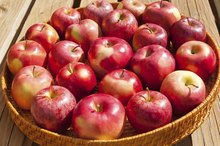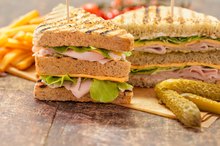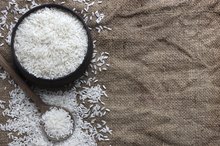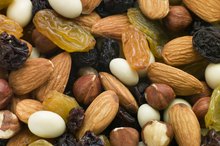What does fact checked mean?
At Healthfully, we strive to deliver objective content that is accurate and up-to-date. Our team periodically reviews articles in order to ensure content quality. The sources cited below consist of evidence from peer-reviewed journals, prominent medical organizations, academic associations, and government data.
- MedlinePlus Dietary Fiber
- Harvard School of Public Health: The Nutrition Source: Fiber: Start Roughing It!
The information contained on this site is for informational purposes only, and should not be used as a substitute for the advice of a professional health care provider. Please check with the appropriate physician regarding health questions and concerns. Although we strive to deliver accurate and up-to-date information, no guarantee to that effect is made.
Can You Eat Very High-Fiber Foods and Still Be Constipated?
Eating high-fiber foods promotes regular bowel function, but eating too much of those foods without adequate fluids and physical activity can have the opposite effect. If you've been eating a low-fiber diet, increasing your fiber intake too quickly can cause constipation, bloating, gas and cramping. Making gradual changes in your diet, fluid intake and activity level can relieve constipation and maintain colon health, says MedlinePlus 1.
Types
Insoluble fiber, also called roughage, comes from the indigestible portion of plant-based foods. Insoluble fiber does not dissolve in water and passes through your digestive system without being absorbed. Bran, whole-grain cereals, nuts and vegetables are rich in insoluble fiber. Soluble fiber turns gelatinous in your system and breaks down gradually. Foods high in soluble fiber include apples and pears, oatmeal and dried beans. Both forms of fiber aid digestion and promote regular bowel movements when eaten in quantities that your body can process.
- Insoluble fiber, also called roughage, comes from the indigestible portion of plant-based foods.
- Insoluble fiber does not dissolve in water and passes through your digestive system without being absorbed.
Significance
Avoidable Causes of Constipation After Starting a New Diet
Learn More
Insoluble fiber helps regulate bowel movements by adding bulk to your stool and easing the passage of wastes through your digestive tract. Fiber also prevents hemorrhoids and diverticulitis according to MedlnePlus. However, if you aren't drinking enough water and other fluids, or if you add roughage to your diet too quickly, your stools may become too large and hard to pass. If you've been eating high-fat proteins and refined, processed sugars and starches without many fruits, vegetables or whole-grain foods, your digestive system will need time to adjust to an increased volume of roughage.
- Insoluble fiber helps regulate bowel movements by adding bulk to your stool and easing the passage of wastes through your digestive tract.
- However, if you aren't drinking enough water and other fluids, or if you add roughage to your diet too quickly, your stools may become too large and hard to pass.
Prevention/Solution
To avoid constipation, gas and bloating, add fiber to your diet slowly and work up to your recommended dietary allowance 1. The Institute of Medicine recommends that men under age 50 should have 38 g total fiber per day, while women under age 50 should have 25 g total fiber daily. For adults over 50, the recommended dietary allowance decreases to 30 mg per day for men and 21 g per day for women. Drinking plenty of fluids to add moisture to stools will also promote healthy bowel activity, says the Harvard School of Public Health (HSPH) 3.
Suggestions
Water Soluble Fiber Foods
Learn More
The HSPH suggests that you increase your fiber intake by substituting whole fruits and vegetables for juices and whole-grain breads and cereals for baked goods made with refined carbohydrates. For additional soluble fiber, replace meat dishes with legumes two to three times per week. If you aren't already exercising regularly, start by taking 10-minute walks two or three times per day and work up to 30 minutes of physical activity most days of the week.
Considerations
Your health-care provider may recommend fiber supplements, if you're still constipated after making gradual changes in your intake of fiber and fluids. Abdominal pain requires immediate medical attention. Talk with your provider about how you can relieve constipation safely and comfortably.
Related Articles
References
- MedlinePlus Dietary Fiber
- Harvard School of Public Health: The Nutrition Source: Fiber: Start Roughing It!
- Dahl WJ, Stewart ML. Position of the Academy of Nutrition and Dietetics: Health Implications of Dietary Fiber. J Acad Nutr Diet. 2015 Nov;115(11):1861-70. doi: 10.1016/j.jand.2015.09.003.
- Francesca De Filippis, et.al. High-level adherence to a Mediterranean diet beneficially impacts the gut microbiota and associated metabolome. Gut, 2015; gutjnl-2015-309957 DOI: 10.1136/gutjnl-2015-309957
- Harvard School of Public Health. http://www.hsph.harvard.edu/nutritionsource/carbohydrates/fiber/
- University of Maryland Medical Center. http://umm.edu/health/medical/altmed/supplement/fiber
- USDA.http://www.ers.usda.gov/topics/
Writer Bio
Anne Tourney specializes in health and nutrition topics. She is a registered nurse with experience in medical-surgical nursing, behavioral health and geriatrics. Tourney earned a Bachelor of Science in nursing from Regis University.









